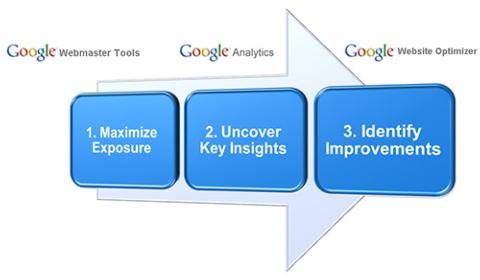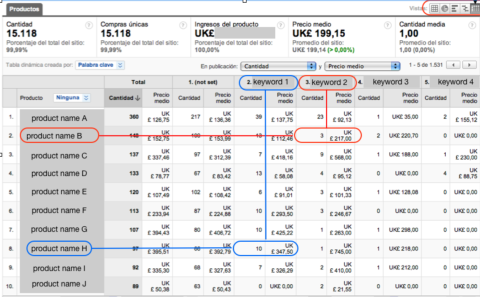Affino meets the Google Trifecta

We’re going through another round of optimising Affino for search engines (SEO) and it’s brought us into the orbit of the Google Trifecta (see the webinar) namely Google Analytics, Google Webmaster Tools and Google Website Optimizer. We’re rolling out much closer integration with these and much more in the upcoming release. It will mean that Affino will be a great solution for SEO Pros.
Why do we care so much about SEO?
There’s no point in putting any effort into running an online business if people can’t find your content. The main ways that happens are through SEO, Social Media (which we care just as much about) and PPC, i.e. paying for clicks in one way or another.
Content is what we classify anything you want people to see, whether it is a product page, a service offering, video tutorial, idle musings or a haiku.
At Comrz we go all out to make Affino the best possible solution for helping you achieve great search engine rankings with the most useful links and content.
Last year we focused on making Affino as good as possible for all the core content, meta data and links. This year we’ve moved on to a higher level and are focusing on the secondary elements such as extending the page meta data further (for better indexing by the search engines) and more importantly providing great analytics on what people are: looking at, doing, buying, talking about, searching for, sharing reviewing and much more. A big part of this is integrating better with the Google tools.
Here’s the list of the SEO improvements we’re doing for the upcoming Affino release:
Google Analytics Integration
It’s been easy to integrate Affino with Google Analytics for a while now, but we’re going to extend that to a new level with full integration with the Google Analytics API. What it means is that you will be able to produce reports like the one below. Specifically to say Adword A cost $20 for the day but we sold for $500. This is an essential requirement for maximizing our PPC budgets with Google Adwords and has already been wrapped.
Credit for the visual below goes to our partner company Hex Digital and Estela Oliva, Analytics and Optimisation Consultant ( twitter.com/estelaoliva ).
We’re also making changes to improve Google Analytics ability to track internal site searches and conversion. This is simply done by including a Q=Search URL variable whenever a search has been completed on the site. This in turn is tracked by Google Analytics.
We’re also extending the shopping cart / checkout to include more stage flags so that it is possible to track conversions more effectively.
Google Website Optimizer
Google Website Optimizer works on the premise that you don’t have to guess what calls to action work the best, instead you can allow Google to run a series of experiments which will tell you which messages lead to the highest conversion rates.
On the surface this is a great proposition, in practice Google has a load of caveats about needing your Webmaster to integrate the code, and that it may not be possible with many content management systems. Having gone through the process, I can also say that it is a real pain in the ass.
The great news is that Google offers an API which will allow us to create extremely powerful experiments within Affino whereby you can try out any number of page layout combinations and message combinations based on using Affino Design Objects. This will make things very easy in comparison and is a completely code-free experience. We will be rolling out support for multivariate experiments which is where you can test multiple different page elements out in differing combinations on the same page and is far more powerful than simple AB testing where you test one page or another.
This project is still under development so there will most likely be changes before launch, but will be a real ’Power User’ tool in the future.
Canonical Links
The third area of improvement we’re making is to roll out Canonical Links. These are essentially a new piece of Meta Data which we’ll be including in most Affino pages. It tells search engines what the underlying URL is for the page a user is looking at.
The importance of doing so is that Google and other search engines can then identify all the links to the same page irrespective of what URL variables are passed in. The net result is higher rankings for pages which might otherwise be lowered as they have multiple different URLs.
Google Webmaster Tools
Affino already supports Google Webmaster Tools very well, but we’ll take on board specific customer requirements as they arise. No change expected at this stage for the next release.
Smaller Pages
We’re continuing our page optimisation in the next release, which means faster load times for both end users and the search engines, which in turn has a positive on the page rankings. This all happens behind the scenes so there’s nothing for anyone to do here once it’s rolled out.
Affino Dashboard and Analytics
It’s hard to talk about any form of Analytics improvements and not mention the Affino analytics. There’s not a great deal of changes, but we have further refined the Affino eBusiness Dashboard and tuned the Group Dashboards we introduced in the last release.


Did you find this content useful?
Thank you for your input
Thank you for your feedback
Upcoming and Former Events
Affino Innovation Briefing 2024
Webinar - Introduction to Affino's Expert AI Solutions - Session #2
Webinar - Introduction to Affino's Expert AI Solutions - Session #1
PPA Independent Publisher Conference and Awards 2023
Meetings:
Google Meet and Zoom
Venue:
Soho House, Soho Works +
Registered Office:
55 Bathurst Mews
London, UK
W2 2SB
© Affino 2024





















